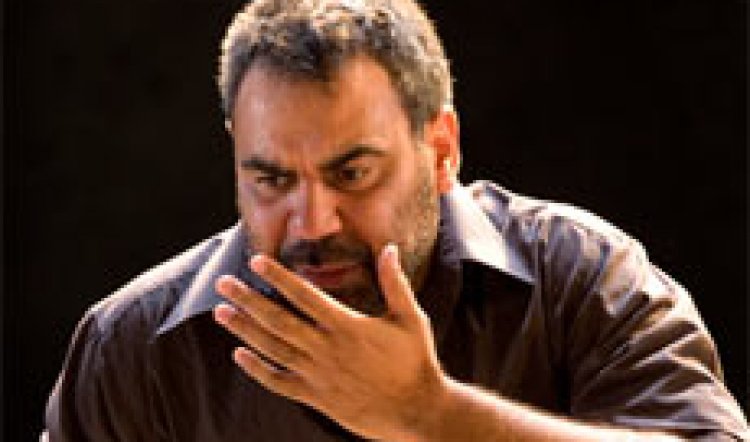
Othello
Othello, Canberra Playhouse, 16-26 May; Melbourne Arts Centre,Playhouse, June 1-16; Orange Civic Theatre, August 1-4; Drama Theatre,Sydney Opera House, June 22-July 18, 2007; www.bellshakespeare.com.au.
On the Bell Shakespeare Company website is all kinds of materialabout its historic 2007 production of Othello. Historic becauseit’s the first time in the company’s 17 years that the play has beenstaged: because John Bell would not do it until he could cast a blackAustralian in the title role.
One quote on the site is from General Colin Powell: “Manyinterviewers when they come to talk to me, think they’re beingprogressive by not mentioning in their stories any longer that I’mblack. I tell them, ‘Don’t stop now. If I shot somebody, you’d mentionit’.”
It’s more apposite than is first apparent. Colin Powell is in many waysa latterday Othello - a man whose decency as a human being andskill as an army general didn’t keep him from being gulled into asituation where he was responsible for many deaths and which led to hisdownfall.
If Wayne Blair has taken inspiration from any major figure of thepast - military or dramatic - it would appear to be Powell. Hisperformance, particularly in the first half, is wide-eyed, open andhonest; loyalty to a fault is an obvious character trait. And hecertainly hasn’t borrowed from previous famously overwhelming Othellos.There is no stentorian voice (Paul Robeson), no burnt corkmelodramatics (Laurence Olivier), and no movie star grandeur (LaurenceFishburne). Instead this Othello is a very human man whose emotionalsimplicity and stature as a soldier are paramount in his sense of selfworth and identity.
 And like the real-life Powell, Blair and his Othello are keenlyaware of their position in the upper strata of the white society inwhich they find themselves - as is everyone else (including theaudience). The extremely talented and able black man is feted andhonoured. His back is slapped, his hand warmly shaken. But hisvulnerability is intense. At any moment, should he slip, thosewelcoming hands could turn to fists; the smiles to snarls, the awardsto weapons. And it goes without saying that he is more vulnerable thanif his features and ancestry were caucasian.
And like the real-life Powell, Blair and his Othello are keenlyaware of their position in the upper strata of the white society inwhich they find themselves - as is everyone else (including theaudience). The extremely talented and able black man is feted andhonoured. His back is slapped, his hand warmly shaken. But hisvulnerability is intense. At any moment, should he slip, thosewelcoming hands could turn to fists; the smiles to snarls, the awardsto weapons. And it goes without saying that he is more vulnerable thanif his features and ancestry were caucasian.
It’s an uneasy business watching Othello negotiate the Venetiancourt where, as their most successful general, he is a highly regardedbastion against the invisible lurking enemy, the Turk. And when itturns out that not only does he love but is loved in return byDesdemona, the beautiful blonde daughter of the local grandee, thatunease explodes into the air in heart-racing cryptic energy.
In Elizabethan England, Shakespeare was able to deal quite openlyand directly with society’s ambivalence towards the “other”. Racism aswe understand it was not something that would have got him thrown inthe Tower - unlike an injudicious jibe at the Queen. The idea of“Black” for Shakespeare would have been informed by complex historicalfactors. He would not have seen it with his own eyes but he would haveknown of the fabled statue (c 1250) of the Black Knight - St Maurice -in Magdeburg cathedral. Maurice (possibly from Mauretania) was not aBlack Knight in the Arthurian Round Table tradition, but a man who isobviously African (see illustration this page from Wikimedia) and a manheld in highest esteem for centuries.
[page]Othello himself is a military hero, a strategist and successful manof Venice. Yet Shakespeare makes him a Moor, at a time in European historywhen the occupation of Spain by the Moors was over by a mere century.(Shakespeare’s first play Henry VI, part I was performed in1592; Boabdil, the last Moorish king of Granada, was expelled in 1492.)Think only of how vivid the protagonists of Gallipoli - Australian andTurk - are to Australians in an almost identical timeframe andOthello’s probable effect on an Elizabethan audience becomes even moreintriguing.

And Othello’s best friend is Iago, a man whose passionate admirationfor the general has sometimes been explained and depicted ashomoerotic. In historical context, however, the complexity of theirmutual affection is too easily dismissed by making Iago’s treachery amatter of spurned lover. As played by Marcus Graham, Iago is abrooding, menacing and (vitally) charming presence.When he isoverlooked for promotion and begins to brood in corners and look snaky,it is obvious - and not simply because the play is one of Shakespeare’smost famous tragedies - that there will be tears and more beforebedtime. His sense of entitlement and deep grievance is palpable andwhen the emotionally naive Othello fails to intuit his displeasure,Iago’s powerful personality almost visibly and very quickly becomestoxic and dangerous.
The two male archetypes - Othello and Iago - are rarely so clearlydefined, nor their friendship and its eventual betrayal and destructiondrawn as more logical and inevitable in Marion Potts’ production. Blairand Graham are an exhilarating match, inhabiting their roles and thelanguage with the ease of old and comfortable shoes.
Also remarkable - and a force field of concentration throughout - isAnni Finsterer as Emilia, Iago’s wife and maid and confidant toDesdemona. She has little to do or say in the first half but herpresence is electric; in the second half, she is simply magnificent.This is just as well because, although Leeanna Walsman’s Desdemonalooks wonderful and projects girlish lust and happiness, bewildermentand pain as well as any starlet might, she really does need to spit outthe mouthful of marbles and stop garbling her words. Dame Maggie Smithtells of being so terrified by her first appearances in Shakespearethat she said every line at the speed of light and prayed to beswallowed up by a crack in the stage. Famously, she quickly learned toenunciate and the rest is history.
Among the rest of the cast, Mitchell Butel (Brabantio) and AmieMcKenna (Bianca) are two fine actors with the capacity to play comedyor drama with equal facility and they do so here; Bob Baines’ Cassioand Ron Haddrick’s Montano are also powerful lessons in how to do it,while Michael Habib’s Clown - a Clockwork Orange punk - iseffective and virtually the only actor in the production whosecharacter isn’t in mortal combat (and losing) with his or her costume.It is impossible to work out any rhyme, reason, logic or plan in theget-ups worn by the hapless players. They make no sense at all andactually contribute to the slight flatness and confusion which afflictsthe first half of the play anyway.
In contrast, Ralph Myers’ set is stark and signifies the Venice of atrading port at war rather than that of sumptuous palazzo and piazza. Aslightly raised timber square playing area occupies centrestage underNick Schlieper’s dramatically godforsaken lighting, with chairs and oildrums stacked at each side. A wall across the back of the stagetakeson the roles of fortress, palazzo and wharf area while Max Lyandvertand Stefan Gregory contribute sound and songs which underline thediscord at the heart of the story.
This production of Othello is historic because, as ColinPowell would observe, a black man is playing the role of the black manin a country where this has not before been considered possible. Notbecause of the overt ideas of white supremacy but because of thecovert: to date no Australian black actor has been thought up to thetask. Be that as it may, Wayne Blair makes the role his own and youcan’t ask for more than that. He is brilliantly supported by, inparticular, Marcus Graham and Anni Finsterer and you can’t ask for muchmore than that either. Maybe while they’re in Melbourne they can pickup some new clothes.



